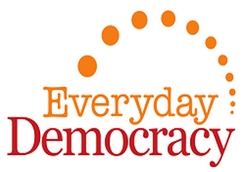|
The 24-page guide, Organizing Study Circles with Young People, was developed by Everyday Democracy [who used to be known as Study Circles Resource Center] and published in 2003. Oftentimes younger people are excluded from participating in engagement efforts, even though youth have much to offer on making decisions and building community. Study Circles are a style of dialogue process, where a small, diverse group of participants can discuss different points of view; usually with the goal of moving from dialogue to action. The guide gives detailed steps for designing a Study Circles process for young people to come together and dialogue. This process encourages youth to be engaged with a variety of perspectives, to hear and be heard, and ultimately to become more active citizens. Below is an excerpt from the guide and it can be found in full to download on Everyday Democracy’s site here or at the bottom of this page. From the guide… With the growth of study circles as a tool for community dialogue and problem solving, more and more organizers in communities and organizations are reaching out to include young people in study circle programs. This is critical, since young people have a stake in helping our communities work — and they bring unique energy, insights, and assets to public conversations and to solving public problems. Young people get involved in study circles in many different ways: in schools; as part of community-based or neighborhood programs; in after-school programs or youth organizations; as part of large youth events and conferences, and in other settings where young people spend time. Sometimes young people and adults are together in study circles; sometimes the circles are for youth only. Through this process, young people learn about issues, gain new skills, have a chance to hear and be heard, and find ways to work with others on the issues that are important to them. In short, they have a chance to experience their own potential as active and involved citizens. Using this guide The purpose of this guide is to help young people and adults organize successful youth study circles in a variety of settings.
Part 1: An overview of youth study circles Young people are key to building our communities and strengthening our democracy. They offer vision, energy, and a distinct point of view about our public concerns. Yet too often, young people are left out of community conversations and decisions — even when the issues directly involve and affect them! Adding these voices to critical community conversations benefits everyone. Young people should be part of the discussions about issues that affect our neighborhoods, schools, congregations, and other organizations. A study circle is a very different kind of conversation for youth and adults alike. The process — making room for all voices, respecting different points of view, emphasizing listening, and searching for common understanding — helps participants address some of our most difficult public issues. Participants find their voice, get involved with others different from themselves, and find ways to make a difference. Youth study circles …
Some study circles involve only young people as participants. In this case, the circles provide a structured process for diverse groups of young people to talk about issues they care about. Fostering important peer relationships, study circles promote honest dialogue without adult interference. In other settings, study circles bring young people together with adults. This approach builds trust and understanding between generations that are often distant or even pitted against one another. With the help of strong facilitation, these study circles provide a setting that offers a new way of hearing one another and then working together. Adults and teens alike attest to the power of this experience. This is an excerpt from the guide, it can be downloaded in full at the bottom of this page or from Everyday Democracy’s site here.  About Everyday Democracy Everyday Democracy (formerly called the Study Circles Resource Center) is a project of The Paul J. Aicher Foundation, a private operating foundation dedicated to strengthening deliberative democracy and improving the quality of public life in the United States. Since our founding in 1989, we’ve worked with hundreds of communities across the United States on issues such as: racial equity, poverty reduction and economic development, education reform, early childhood development and building strong neighborhoods. We work with national, regional and state organizations in order to leverage our resources and to expand the reach and impact of civic engagement processes and tools. Follow on Twitter: @EvDem Resource Link: Organizing Study Circles with Young People
0 Comments
Your comment will be posted after it is approved.
Leave a Reply. |
Categories
All
|
Follow Us
ABOUT NCDD
NCDD is a community and coalition of individuals and organizations who bring people together to discuss, decide and collaborate on today's toughest issues.
© The National Coalition For Dialogue And Deliberation, Inc. All rights reserved.
© The National Coalition For Dialogue And Deliberation, Inc. All rights reserved.

 RSS Feed
RSS Feed